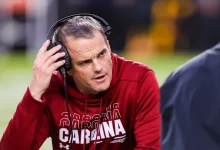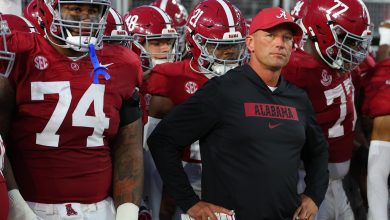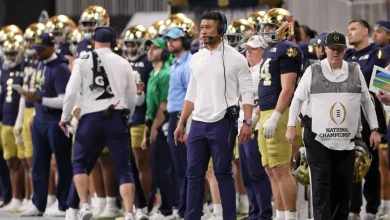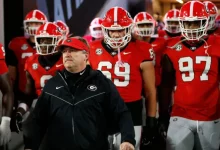Fox exec: Texas ‘exercised their contractual right’ in vetoing Ohio State opener’s move to Sunday

Fox exec: Texas ‘exercised their contractual right’ in vetoing Ohio State opener’s move to Sunday
In the world of college football, scheduling conflicts and broadcast rights often become a battleground where networks, conferences, and universities negotiate fiercely to maximize viewership and revenue. A recent development involving the Texas Longhorns, Ohio State Buckeyes, and Fox Sports has highlighted how contractual rights can shape the game’s broadcast landscape — quite literally.
A Fox executive recently clarified that Texas “exercised their contractual right” in vetoing a proposal to move the Ohio State opener to Sunday, a move that sparked significant discussion across the college football community. This decision, rooted deeply in the contractual language between Texas, Fox, and associated partners, underlines the power dynamics and legal frameworks that govern college football scheduling.
This article explores the background, implications, and broader context of Texas’s decision to block the Sunday scheduling of the Ohio State opener, delving into the contractual nuances, network strategies, and the impact on fans and stakeholders alike.
—
### The Context: College Football Scheduling and Broadcast Rights
College football’s broadcast rights have grown exponentially valuable over the past two decades. Major networks like Fox, ESPN, CBS, and NBC compete vigorously to secure live game rights that deliver massive viewership, advertising revenue, and brand exposure.
Scheduling games at optimal times is a critical aspect of maximizing these benefits. Prime-time slots — typically Friday, Saturday, and Sunday evenings — attract larger audiences, yet they also come with constraints regarding league rules, player welfare, and broadcast agreements.
Within this framework, schools and conferences negotiate with networks to find mutually beneficial arrangements. But such negotiations are bound by contracts that often contain clauses empowering one party to veto or approve scheduling changes.
—
### The Proposal: Moving Ohio State’s Opener to Sunday
The Ohio State Buckeyes are among college football’s most popular and heavily viewed programs, often drawing millions of viewers on broadcast days. The proposed move to shift Ohio State’s season opener to Sunday was seen by Fox Sports as a strategic attempt to capture a prime-time audience with minimal competition from other major sports broadcasts.
Sunday afternoon and evening slots often present lucrative opportunities, especially outside of the NFL season or on weekends with fewer competing games. Fox’s consideration to shift Ohio State’s game to Sunday was designed to boost ratings and capitalize on a captive audience.
—
### Texas’s Veto: Exercising Contractual Rights
However, Texas, which has recently joined the Big Ten conference alongside Ohio State, exercised its contractual right to veto this scheduling change.
A Fox executive involved in the negotiations explained: “Texas exercised their contractual right in vetoing the move. This is not a matter of preference but a clear exercise of the terms we agreed upon. These contractual rights exist to protect schools and ensure that scheduling respects the interests of all parties.”
Texas’s contract includes clauses that allow it to approve or reject changes to game times, especially when those changes might affect team preparation, fan attendance, or competitive balance. In this case, the veto prevented Fox from unilaterally moving the Ohio State opener to Sunday.
—
### Why Did Texas Veto the Move?
Several strategic and logistical reasons motivated Texas to veto the move:
* **Tradition and Home Game Atmosphere:** Texas values the traditional Saturday game day experience. Moving a game to Sunday can impact attendance, tailgating, and overall atmosphere at the stadium. Texas, mindful of maintaining this culture, may have found Sunday scheduling less desirable.
* **Fan and Student Access:** A Sunday game could interfere with fans’ workweek preparation or other Sunday commitments, potentially reducing attendance or game day participation.
* **Competitive and Preparation Considerations:** Scheduling changes can affect team preparation routines, practice schedules, and recovery periods. Texas likely sought to ensure the team was not disadvantaged by an unusual game day.
* **Contractual Leverage:** Texas’s veto power is a negotiation tool that allows the school to influence scheduling and assert its importance within the new Big Ten landscape.
—
### Contractual Rights in College Football Broadcasting
This episode highlights how contracts shape college football’s broadcast ecosystem. Contracts between networks and schools or conferences outline rights and obligations, including:
* **Game Time Approvals:** Who can approve or veto scheduling changes.
* **Blackout Rules:** Circumstances under which broadcasts may be limited.
* **Revenue Sharing:** How income from broadcasts is distributed.
* **Exclusivity:** Which networks have exclusive rights to certain games or time slots.
These clauses protect the interests of schools like Texas, ensuring they have a say in how their games are presented to the public.
—
### Implications for Fox Sports and Future Broadcast Negotiations
Fox Sports, like all major broadcasters, aims to optimize its schedule to maximize ratings and advertising revenue. The veto highlights the limits of network control when schools hold contractual veto rights.
Going forward, Fox may need to negotiate more collaboratively with member schools to balance network goals with school preferences. This incident could set a precedent for other schools to exercise similar contractual rights, potentially complicating broadcast planning.
—
### The Fans’ Perspective
From a fan’s standpoint, the veto may be disappointing to some who hoped for a Sunday night showdown featuring Ohio State, a marquee program. Sunday prime time is often more accessible for viewers who cannot watch games during busy Saturday schedules.
However, fans of Texas and other schools may appreciate the preservation of traditional game times that enhance the overall college football experience.
—
### Broader Trends in College Football Scheduling
Texas’s veto fits within larger trends affecting college football:
* **Conference Realignment:** Texas and other schools moving conferences impacts scheduling, broadcast contracts, and rivalries.
* **Increased Network Leverage:** Networks compete fiercely for content, driving complex negotiations.
* **Fan Engagement:** Schools balance maximizing broadcast exposure with maintaining fan attendance and game day culture.
The decision by Texas to veto the Sunday scheduling of the Ohio State opener is a clear example of how contractual rights influence college football broadcasts. As Fox executive remarks, this was a legitimate exercise of contractual authority, reflecting the balance of power between schools and networks.
As college football continues to grow commercially, these contractual dynamics will remain central to how games are scheduled and presented. For fans, schools, and networks alike, understanding these legal and strategic frameworks is key to appreciating the evolving landscape of college football.









